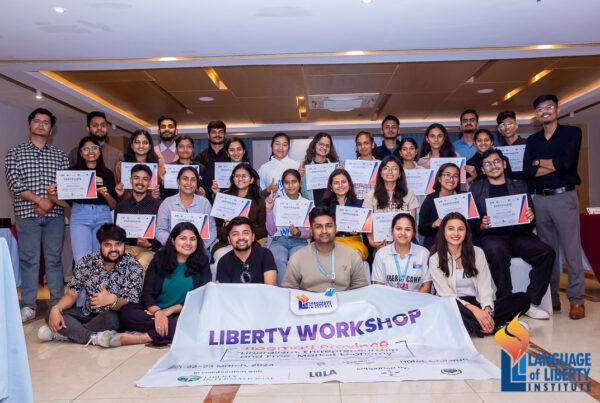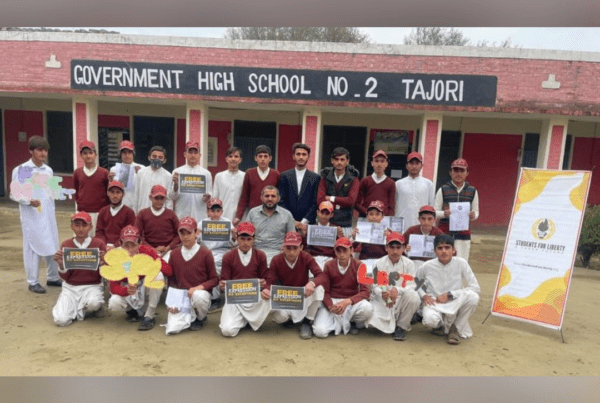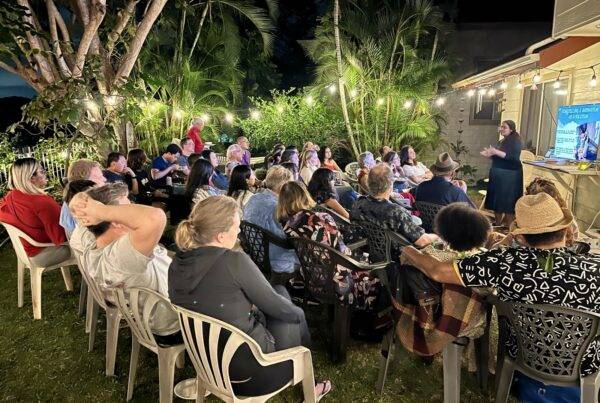Riya Basnet and Nisha Niraula are young leaders in the liberty movement in Nepal. They are involved with Students for Liberty, Women for Liberty, and published the first Braille edition of Jonathan Gullible. They spoke with Joe Kent at the World Conference on Market Liberalization in Bali in July, 2015.
Joe: Can you talk about the Women for Liberty Project?
Nisha: A year ago, we did the campaign, and we specifically focused on women. We went to the rural areas of eastern Nepal. We tried to explain our program to the rural area. But before moving to that grassroot level, we conducted seminars in the four walls of the room. But while conducting seminars, we found that the main issue, main problems, are in the area where the women are facing problems.
Joe: What kinds of problems are they facing?
Nisha: Women are dominated by society, dominated by norms, they are intervened by societal norms, their families and such. Women in rural areas want to work outside — going beyond the boundry of their home because of the dominance of the family.
Joe: So your talking about women in rural areas are oppressed right now, and you’re trying to spread the message about liberty, and more power for women?”
Riya: Yes. These women they save certain savings, but they don’t know where to invest it. So first of all we did research. We found out what are the major problems that are hindering them to go out and work for themselves. So we decided to conduct a workshop where we invited local female entrepreneurs . . . and we helped these women to know about what to do about their savings, how to invest it.
Joe: What does investment look like in rural areas?
Riya: Like small shops, like tea shops. Small chocolate shops, like very small, very micro. Investment in these shops can help them generate income because you don’t see shops in rural areas. It’s very far. You need to walk to town, you don’t find it in downtown. If you start a small shop in these places, it will be a good income generating for these women.”
Joe: Why don’t we see small shops in those areas? People aren’t thinking to do it?
Riya: Yeah, maybe. Most of the males of the family go to the town area and work there. But inside the downtown area you don’t barely see it. So these women were educated to start a small shop which does not exceed $50. You only need $50 to start a small shop.
Joe: $50?
Riya: Yes. It’s a small shop, like a tea shop. You don’t have to put up a structure for that. You just have to have a mat, and you just sit there and you have your products lying down on the mat, and you just sell it out. So that’s what they’ve been teaching them. Some of the women have started small shops. Other women have been provided with skills like, how to grow mushroom vegetables that they can go to the town and sell it to the town. So these training have been given so far. So we’ve been connecting them with the institution who has been providing this sort of trainings.
Joe: I see, and the institution is?
Riya: Krishi Club and Seva Nepal.
Riya and Nisha also talked about their work publishing the first edition of Jonathan Gullible
Riya: This is the Braille edition of The Adventures of Jonathan Gullible that we just published.
Nisha: This is part one, and this is part two.
Riya: This is the first Braille edition.
Joe: Can you tell a brief overview of what is this story about?

Riya Basnet, Ken Schoolland and Nisha Niraula with the first braille edition of The Adventures of Jonathan Gullible.
That story struck me, and I have to publish it! How did I come up with this idea to publish the Braille edition, it was like. When we were out there taking campaigns to schools and colleges, there was one student who asked me about, “Is there anything for blind people?” There are a lot of blind students who have been studying in Nepal. We came with the idea — let’s get a libertarian book published in Braille, but we did not know which book to publish.
When I was there in the Shanghai Austrian Economic Summit, I came across Ken Schoolland’s “The Adventures of Jonathan Gullible”. Then at that moment I studied that book right there, and I was like, “Okay, I’m going to publish this.” I talked with Ken, and he was very impressed with the thing that I mentioned. At that point, he said, “We are going to publish this book.”
It took us one year, we found out institutions where we can distribute our book, then we started publishing our book. So it’s a year by now, so we published our book, it’s in our hand.
For more of the interview:



